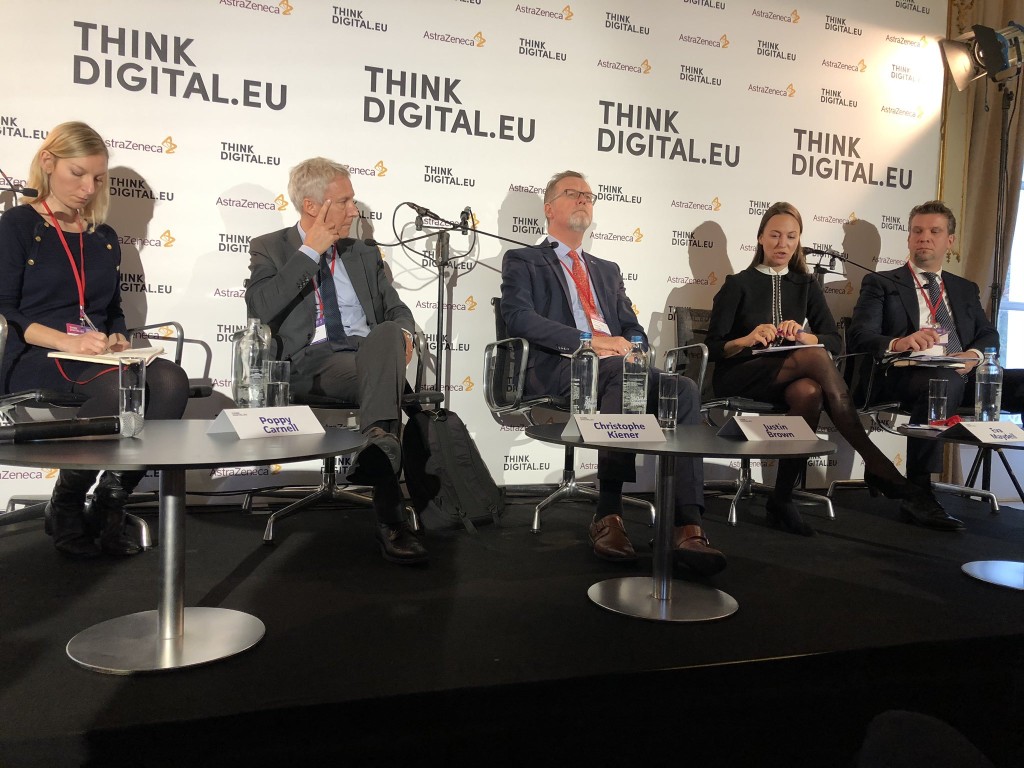2019 saw an increased focus on digital policy issues affecting industries not traditionally associated with technology, such as healthcare and trade. While EU citizens have welcomed new rules for the digital age that improve consumer rights and privacy, certain industries are becoming overwhelmed with the level of compliance they must adhere to. Accordingly, the European Business Summit (EBS) gathered industry experts and policymakers to discuss a push for human centric digital transformation at their annual ThinkDigital conference on 7 November in Brussels.
EU Commissioner designate for Justice, Didier Reynders, kicked off the event by discussing the Commission’s priority of strengthening the digital single market. He acknowledged EU and industry efforts in building consumer trust by protecting the digital market, including setting the global data protection standards through the GDPR. Reynders stressed the need for a coordinated and human-centric approach at the EU level for new technologies: “Innovation in the digital field and promotion of our fundamental values should always go hand in hand.” For example, the Commission want to ensure a greater level of coordination across member states as they plan to present a coordinated approach on AI within 100 days of taking office in December 2019. However, by rushing to regulate something as complex as AI, the EU risks regulating too soon and thus restraining a new wave of innovation. This could lead to serious legislative barriers for companies trying to develop and implement AI solutions in Europe.
Better Access to Health Data
The conversations that followed focused on the digitalisation of the healthcare sector. Digital and AI-based solutions improve diagnostics and treatment, but also face barriers in the area of interoperability, data protection and standardisation. MEP Cristian-Silviu Busoi stated that ensuring citizens’ secure access to personal health records, improving interoperability between member states, and providing solutions for digital health were the Commission’s priorities.
The biggest challenge for the further digitalisation of health systems is the lack of interoperability within and between countries. Many institutions in the public and private sector work in silos and lack funding. Political will is also fragmented. Hans Sijbesma, Country President for Germany at Astra Zeneca, pointed out that the GDPR can be restrictive: “In Europe, we sit on mountains of data that we are not using.” Regulation concerning medical data limits what information can be used and often prevents bulk analysis. Industry is therefore focused on how to access, gather and process health data as research requires big data pools. Requesting the consent of every data subject considerably slows down innovation in the field. One ethical solution in the use of health data is to ensure data is anonymised.
Modernising Trade for the Digital Age
Digital trade rules are crucial to economic competitiveness, job creation and innovation. However, common multilateral rules for online trade are non-existent. Some 90 countries came together at the World Trade Organisation (WTO) to develop new global rules on e-commerce that remove trade barriers and ensure online safety. The initiative, chaired by Australia, is a breakthrough in a previously stagnant area. It could help create an international framework covering areas like data localisation, data flows and a permanent ban on customs duties on electronic transmissions. This would mark a major shift from the complicated web of rules that exist today. Justin Brown, Australian Ambassador to the EU, expects major developments in time for the WTO Ministerial Conference in June 2020.
The panel agreed on the need to strengthen the free flow of data at the international level. Imposing data localisation requirements or restricting cross-border data transfers could lead to further fragmentation that would make cross-border operations difficult. MEP Eva Maydell, who successfully advocated for the free flow of data within the EU, noted that there is a need to enable this outside of the EU. Maydell also expressed concern of the EU’s protectionist approach that could hamper innovation: “EU companies need global partners, and trade is the vehicle for this.”
Another challenge in modernising trade is balancing between creating opportunities for businesses and protecting consumers rights. How do we regulate privacy in a group of 90 countries that all have different approaches to data? Thomas Boué, DG of EMEA Policy at BSA, believes the solution is in the convergence of rules: “We can’t create the same rules in every country, but we need to create a way to converge these rules.”
‘Digital’ underpins every industry and aspect of global trade. Creating harmful policy could lead to further fragmentation that would make cross-border operations problematic. For the EU to remain competitive, businesses and governments need to enable a smooth digital transformation for all industries. This means investing in R&D for digital technologies and bringing them to market. It also means crafting regulation that protects consumer rights and supports innovation. Additionally, all actors must invest in digital education and reskilling as human capital will remain the driving force in Europe’s digital future.





